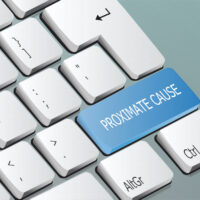Proximate Cause vs. Actual Cause in Personal injury

In order to bring a successful personal injury claim, the plaintiff must show four things: duty, breach, causation, and damages. Often, duty and breach are shown by proving negligence—for example, a driver breached their general duty to operate safely by speeding through a stop sign. In such a case, causation and damages are equally clear: The driver hit the plaintiff in the intersection, causing physical injury. Cases can quickly become complicated, however, when more actors are involved. What if a pedestrian threw a rock at the car, distracting the driver just before the stop sign? Is the pedestrian liable? What if that pedestrian was intoxicated from drinking at a bar, prompting their reckless behavior? Is the bartender who served the drinks liable?
To determine who is liable after an accident, courts look at two types of causation: “actual” cause and “proximate” cause. Read on to learn about proximate cause and actual cause in West Virginia negligence claims. If you’ve been injured in a West Virginia car crash, call a dedicated Martinsburg motor vehicle accident lawyer for advice and representation.
Distinguishing Actual Cause and Proximate Cause
West Virginia courts distinguish “actual” cause from “proximate” cause in personal injury matters. The actual cause, also known as the “cause in fact,” refers to the factual event that literally caused the injurious incident. For example, if a driver blows through a stop sign and hits a pedestrian, the driver’s actions are the actual cause of the pedestrian’s injuries–the driver operated the vehicle, foot on the pedal, through the stop and into the pedestrian.
Although the driver’s actions were the actual cause of the victim’s injuries, the driver might not be legally responsible for the accident. There could be other intervening or preceding factors that led to the accident. Some other cause or causes may be the “proximate cause” of the accident.
A proximate cause is the legal cause of the injury. Proximate cause, in addition to actual cause, determines liability. In the stop sign example, let’s say that the driver’s tire blew out because of a manufacturing defect. Although the driver was operating the vehicle at the time of the accident, if the blown tire sent the car careening into the pedestrian, then it was the tire blowout that proximately caused the accident. The auto manufacturer may then be held liable for the victim’s injuries.
Proving Proximate Cause in a West Virginia Personal Injury Case
West Virginia law dictates that a personal injury plaintiff can recover from any party who proximately caused their damages. West Virginia uses a modified comparative fault standard, under which any party who proximately caused the damage is partially responsible; liability is “allocated to each applicable person in direct proportion to that person’s percentage of fault.” That includes defendants, nonparties, and even the plaintiff–if the plaintiff was partially responsible for the accident, their damages award may be offset by their share of fault.
Determining liability, then, requires determining which parties’ actions were a proximate cause of the plaintiff’s injuries. Determining proximate cause requires evaluating whether a given party could have reasonably foreseen that their actions would cause the ultimate harm. In assessing proximate cause, the court may consider whether the defendant could have foreseen the type of harm inflicted, the severity of that harm, and the manner in which the harm was inflicted.
Determining proximate cause can quickly turn into a complex legal analysis. Some courts use a “but for” test–would the plaintiff’s injuries have occurred but for the defendant’s actions? Others use a “substantial factor” test–were the defendant’s actions a “substantial factor” in causing the plaintiff’s injuries? A knowledgeable personal injury attorney can review the circumstances of an accident to assess whose actions may have caused the plaintiff’s harm and how best to prove actual and proximate cause.
Call for Help With a Martinsburg Personal Injury Claim
If you or someone you care about has been hurt through someone else’s negligence in West Virginia, call the dedicated and diligent Martinsburg personal injury attorneys of Burke, Schultz, Harman & Jenkinson at 304-263-0900 or (304) LAWYERS for a free consultation.